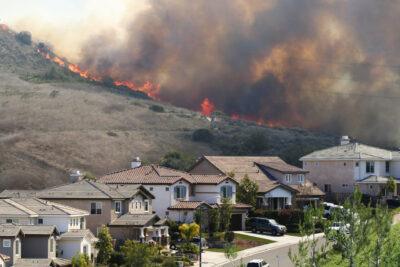|
Listen To The Article
|
Everybody needs to prepare for wildfires because the danger from such destructive blazes is growing dramatically. The wildfire danger has increased by 49% in the last ten years, Wildfire Today reported.
2017 was the second worst year for wildfires in US history, Wildfire Today said. Fires destroyed 9.781 million acres in the United States last year – nearly twice the area burned in 2016.
2018 might be equally as bad or worse than 2017, news stories indicate. One state, Colorado, experienced two big fires during the week of April 16.
The 117 Fire south of Colorado Springs destroyed 23 homes and consumed 40,800 acres on April 17, The Denver Post reported. Another blaze closed a major transportation artery, Interstate 70, near Fruita in Western Colorado on April 19, Fox 31 News disclosed.
How To Protect Your Property From Wild Fires
The bad news is that there is no way to protect property from wildfires completely. Despite this reality, there are many steps you can take to make your home, farm, cabin, or business more fire-resistant.
Steps to make your property fire-resistant include:
- Create a firebreak around buildings, vehicles, propane tanks, woodpiles, and anything else you want to protect.
The firebreak should cover what U.S. Forest Service fire scientist Jack Cohen called the ignition zone, which is the distance that flames can jump. The National Fire Protection Association (NFPA) has recommended this course of action.
- The NFPA recommends the following firebreaks:
- Keep all trees, bushes, and shrubs at least five feet away from buildings and vehicles. There should be no branches or bushes touching any structure on your property.
- Make sure that the forest or brush is at least ten feet or farther from buildings.
- Keep grass and weeds on your property cut as short as possible.
- Clear out any debris or any other unused item that can burn. This list would include deadwood, weeds, trash, litter, building supplies, unused firewood, lumber, junk vehicles (they contain flammable parts including batteries, tires, rubber hoses, and seats), and any container that might hold flammable liquids.
- Keep trash in covered metal containers such as cans or a dumpster. Plastic dumpsters can burn, so consider paying extra for a big metal one.
- If possible, get rid of your propane tank and switch to natural gas. Propane tanks can explode and make fires worse.
- If there is no natural gas in your area, consider burying your propane tank or moving it 20 to 30 feet from buildings. Do the same with tanks for gasoline and diesel fuel.
- Make sure that you store propane tanks for grills away from the house. A good suggestion is to keep the propane tank in the garage or the barn when you are not grilling.
- Replace wooden shake shingles with a metal or tile roof. Shake shingles will burn, especially if they are dried out by the sun. If you want more electricity, consider installing a Tesla Solar Roof with tiles that double as solar cells.
- If your house has wooden walls, consider covering them with aluminum siding or tiles.
- The next time you re-roof, replace the asphalt shingles with tile or metal, as these are more fire-resistant.
- If you have a swimming pool, stock tank, or pond on your property, keep it filled with water. Firefighters will be more likely to protect your property if they have an easy-to-reach source of water.
- Consider building a swimming pool, stock tank, or pond to supply firefighting water.
- Be careful with backup power systems and electric or hybrid vehicles. Many of them contain lithium-ion batteries that can explode if they overheat.
- Conduct target practice as far from your buildings as possible, or better yet, go to a shooting range. Target shooting is a significant cause of wildfires, the Bureau of Land Management (BLM) reported. Therefore, it would be a good idea to postpone target practice when fire danger is high.
- Join your local volunteer fire department. You can learn valuable skills, get access to firefighting and life-saving equipment, and increase the manpower available for fighting wildfires in your area. Something to consider is that firefighters receive advanced warning of emergencies like fires in your area.
Making your property as fire-resistant as possible is the best way to prepare for fire season.
 Off The Grid News Better Ideas For Off The Grid Living
Off The Grid News Better Ideas For Off The Grid Living




